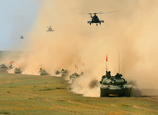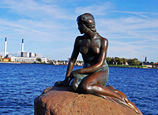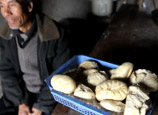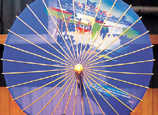
SEOUL, Jan. 24 (Xinhua) -- South Korea's economic growth accelerated in the fourth quarter from three months earlier, after rising 0.1 percent in the prior three months, as stronger won helped boost private consumption.
Real gross domestic product (GDP), the broadest measure of economic performance, increased 0.4 percent in the three months ended Dec. 31, up from a revised 0.1 percent growth in the third quarter, the Bank of Korea (BOK) said in a statement on Thursday. The figure was seasonally adjusted.
Private consumption rose 0.8 percent, offsetting reduction in other items of the expenditure side such as exports, imports and facility investment. The won's ascent against the U.S. dollar enhanced purchasing power of domestic consumers, resulting in consumption growth.
"To some extent, import prices fell after the won/dollar exchange rate declined," Kim Young Bae, director general of the BOK's economic statistics department, said on the sidelines, replying to whether private consumption was boosted by stronger won.
For the whole year of 2012, the economy grew 2 percent from a year earlier, the lowest in three years. Exports and consumption grew at a slower pace, and facility investment posted a minus growth last year.
STRONG WON
South Korean Finance Minister Bahk Jae-wan said Wednesday that the country is ready to tackle the won's ascent against the greenback, strongly hinging that another measure to ease volatility in the won/dollar rate would come in the foreseeable future. Bahk noted that "preparations for additional market stabilization measures have been completed."
South Korea has raised its worrying voice over side effects from stronger won as the accelerating won's ascent will damp the export-driven economy. The finance ministry said in a report that the won's appreciation against the dollar will cause worsening profitability of export companies in the short term, while weakening export competitiveness amid higher export prices in the long run.
The won rallied 7.58 percent versus the greenback in 2012 due to quantitative easing by central banks in major economies and the relatively solid fundamentals of the country. The local currency surged almost 20 percent to the Japanese yen as expectations for expansionary monetary policy spread under the new government in Japan.
Amid the stronger won, exports of goods and services declined 1. 2 percent in the fourth quarter from the prior quarter. Imports retreated 1.1 percent amid higher commodity prices, and facility investment sank 2.8 percent on weak demand for semiconductor equipments.
"The won/dollar exchange rate is assessed to have no material impact on the 4Q GDP figure. It remains to be seen whether the rate will affect the reading," Kim at the BOK told reporters.

















 Going back home: A standing journey
Going back home: A standing journey


![]()
